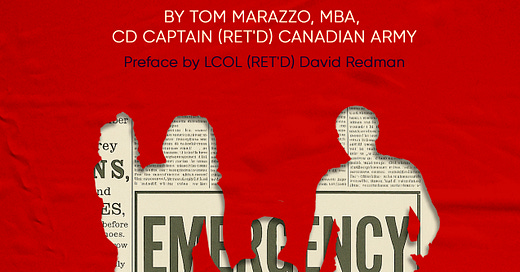I didn’t write this book to scare anyone. I didn’t write it to sell you gear, or to suggest the end is near. I wrote it because I’ve spent most of my adult life preparing for the worst - so others didn’t have to. And after what I’ve seen over the last few years, I can’t in good conscience keep that knowledge to myself anymore.
As a veteran, I was trained to plan for chaos. Not just to survive it - but to lead through it. I learned how to make decisions under pressure, how to anticipate the unexpected, and how to build a plan that works even when everything around you is falling apart. It’s a way of thinking that was drilled into me for decades. And it’s the kind of thinking I wish every family had access to - especially now.
We’re living through a time where leadership is uncertain, systems are stretched thin, and ordinary people are being left to fend for themselves. The middle class is shrinking, trust in institutions is crumbling, and many of us feel like we’re standing on shaky ground. I wrote The People’s Emergency Plan because I believe that when governments fail or stall, it’s not panic that should take over - it’s preparation.
This book is the result of taking professional military and emergency planning frameworks and translating them into something that anyone can use. Not theory - real tools. You won’t find fear-mongering or conspiracy theories in these pages. You’ll find a process. A way to think clearly when others freeze. A way to act deliberately when time is short. A way to protect what matters most.
This is about responsibility. To yourself. To your kids. To your friends. To your community. It’s about realizing that help may not always arrive when it’s needed - and choosing to be ready anyway.
That’s what I’ve tried to give you here: a blueprint, grounded in service, shaped by experience, and offered to you with the hope that you’ll never need to use it - but will be ready if you do.
~Tom Marazzo
https://a.co/d/ciUy6Qx





Can I post this with your name on it? This is great 🙏
As a former emergency procedures and disaster recovery professional with the Ontario provincial government, I emersed myself in how to respond to emergency situations from a corporate perspective and it translated into home preparedness. For anyone wondering if this volume is even necessary, I can state most emphatically that it should be on everyone's bookshelf, used to create a personal action plan, and referenced regularly.
Disasters, whether manmade or natural, don't wait for you to prepare. Not preparing is a recipe for chaos. Having attended numerous conferences and seen the results of actual incidents and the response failures/successes gave me an acute awareness of the fragility of our infrastructure - electrical, water, communication, and food/shelter.
I recommend people review what happened with the Lac Megantic train accident, and the flooding in Quebec, the recent and previous ice storms and blackouts that impacted the Eastern Seaboard and ask yourself, "Am I ready to deal with such an episode?" If the answer is 'No', then this book is vital for you.